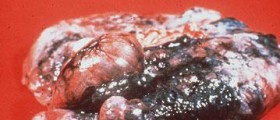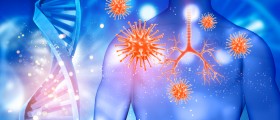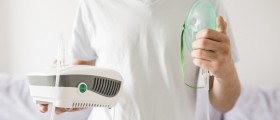
Emphysema is a long-term and progressive disease which is together with chronic bronchitis a member of COPD (chronic obstructive pulmonary disease). It is characterized by destruction of the alveolar walls which leads to subsequent reduction of the surface through which oxygen is absorbed and carbon dioxide released. Progression of the disease leads to insufficient supply of the body with oxygen.
Apart from destruction of alveolar walls, there is also collapse of airways contributing even more to breathing difficulties these patients face with. Oxygen saturation is initially optimal or slightly reduced. Progression of the disease is accompanied by low level of oxygen. Because of that the heart works harder to push blood to all parts of the body craving for oxygen. As a result, the heart eventually becomes larger (hypertrophy) and weaker and changes in the lung cause pulmonary hypertension.
Emphysema Treatment Options
Even though emphysema is practically not curable, there are treatments which may postpone progression of the disease and deal with ongoing symptoms and signs. In later stages, the goal of the treatment is to improve patient's quality of life and help patients continue with at least simplest daily activities, making them less dependent on other people. Apart from medicamentous therapy patients suffering from emphysema must also undergo physical therapy and learn exercises which will improve supply of the lungs with oxygen.
The Importance of Smoking Cessation
Most patients who are diagnosed with emphysema are heavy smokers. The condition is actually closely connected with the use of tobacco. This is why they must get rid of this nasty habit as soon as possible. If one does not chose to quit smoking, his/her disease progression will be much faster.
Medications for Emphysema
Bronchodilators are medications all emphysema patients are prescribed with. These drugs relax smooth muscles in the airway this way allowing more air to enter the lungs. Bronchodilators are administered via metered dose inhalers (MDIs), powder inhaler devices or nebulizer machine. Some of the short acting bronchodilators are Albuterol agents and ipratropium bromide (an anticholinergic agent) while the long acting bronchodilators include salmeterol, formoterol and tiotropium.
Certain number of patients apart from bronchodilators also require inhaled corticosteroids. They are efficient against inflammation. In emergency situation patients suffering from emphysema may be administered corticosteroids intravenously.
Antibiotics are frequently prescribed to these patients. They treated recurrent pneumonia and are many times administered prophylactically.
Patients in whom oxygen saturation is inadequate must receive supplemental oxygen. Oxygen is administered occasionally, with exercise, and once the disease has significantly progresses, oxygen may be necessary during the night or even throughout the day.

















Your thoughts on this
Loading...